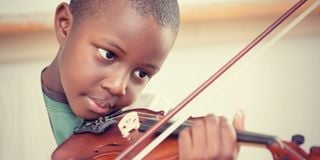Why music is important in child development

Relationships require a degree of honesty. But be careful not to share too much.
PHOTO/NET
What you need to know:
Music rhymes and sing-a-longs help children to learn language and vocabulary through repetition and memorisation. Music sharpens children’s ability to apply logic in their thinking and builds cognitive skills
Davies’ parents have complained severally about his lack of concentration in class. At 10 years, he is a hyperactive kind of child. He always scores poor grades in class. His father decided to enrol him in a music school in Kampala, to occupy his holidays with some worthwhile activities.
A year later, they noticed a remarkable improvement in his academic performance to the surprise of his parents, teachers and fellow pupils. He is now a stellar performer in class. The father attributes his son’s academic improvement to the piano lessons that Davies had been studying for this while. Imagine that!
Music is a powerful tool in the development of children in their early years. This is mostly true when children engage in musical activities that include active listening, improvisation, composition, movement and playing a musical instrument. These are some of the probable advantages that Davies must have found in his new way of spending time.
Emotional development
Children who learn music end up nurturing their emotions unconsciously. “I get to express my feelings, thoughts, and emotions through writing songs and singing, better than I would if I were asked to talk about them,” says Divine Kirunga, a 12-year-old Primary Six pupil at Kampala Standard School.
Emotional therapy
Music is good for emotional therapy for children who have undergone certain traumatic experiences and have behavioural and learning challenges. It gives these children a chance to express their emotions. Emmanuel Alinaitwe, a music tutor at Talanta Music Tutoring Services, on Entebbe Road says, “I have seen children who had discipline issues improve from the time they started learning music. Music requires discipline and patience. And because music is usually driven by passion and desire, the child learning it will instinctively obey its rules, principles and concepts without resistance.”
Motor movement
A child’s brain connections are formed in the first three years of their life and these connections are primarily responsible for the development of language, speech, motor, and cognitive skills. Learning how to play musical instruments involves memorising intricate finger, hand-eye coordination and foot movements, while paying attention to the right notes, sounds, rhythm and pitch. This process sharpens a child’s brain’s ability to listen and memorise and aid their motor skills involving small muscles and intricate movements and gross motor skills involving large muscles which aid movements, coordination and speech.
Builds confidence and creativity
My nephew, Kwezi, is introverted and had issues socialising with fellow children. From the time he joined the music school and learnt how to play the guitar, his characater has changed. “He freely expresses himself now. I am surprised at the choice of songs he makes. Music has helped him become more social and confident and develop good friendships with his classmates,” says his mother.
Soothes pain and calms nerves
We often sing lullabies to children to put them to sleep or to calm their nerves if they are unhappy. Researchers at Stanford University say; “listening to music changes brain functioning to the same extent as medication.” Slower music causes alpha brainwaves, responsible for relaxation. Music can make an unfamiliar environment friendly, in cases where children who have been home for much of their time are experiencing a class for the first time. To blend in with the environment and the rest of the children, music should be part of their class experience.
Happiness
Music makes children happy, just as it does adults. And when they are happy, they become emotionally and physically healthy, which leads them to sleep and eat better and become more active. And because they are happy, their bodies release endorphins (feel-good hormones), which prevent them from getting stressed and falling ill, thereby boosting their immunity. If you identify your child to be happy when music is played, engage them in the activity.
Improves IQ
Music sharpens a child’s ability to think critically. As a child develops in their infancy stage, music tends to sharpen their ability to apply logic in their thinking. According to research, music stimulates the part of the brain responsible for spatial-temporal reasoning, which boosts a child’s ability to learn challenging subjects such as mathematics. Music requires the skill of using different body parts independently, which means the child’s brain would be multi-tasking. As they pay attention to the details in the melody at a constant tempo, a child’s cognitive ability is sharpened. Children who learn music are very keen on details. The process of understanding, memorising, and applying musical concepts requires a lot of concentration , which makes learning music a good idea for teaching a child, activating and developing their cognitive functions.
Learning style
Music is the learning style of children, often referred to as aural (or auditory or rhythmic style). This style is one of the eight types of intelligence defined by Howard Gardner in his theory of multiple intelligences. It is used in appreciating music or playing a musical instrument. Children who learn by this style usually learn through rhythms and rhymes, which help them visualise and memorise information in a fun way, away from the traditional instruction methods. Even for most adults, information is easily memorised if it is put into a song. As a teacher or parent, incorporate music in their learning experience.




